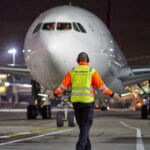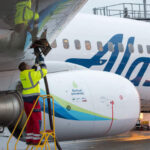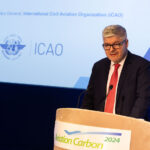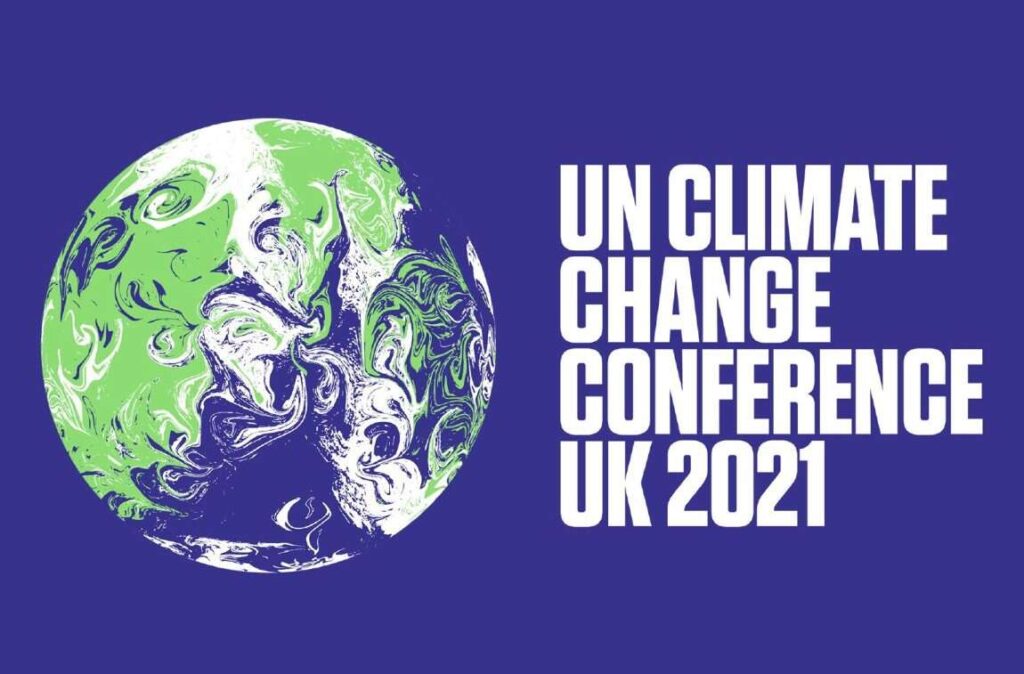The UK is to unveil the International Aviation Climate Ambition Coalition during COP26, which will call on ICAO member states to adopt a long-term goal at next year’s ICAO Assembly. Around 15 countries are believed to have already agreed to join, including the United States. “Aviation emissions are an inherently global issue in need of coordinated global action and that’s never been more urgent than it is now as we prepare to host COP26 in Glasgow,” UK Transport Secretary Grant Shapps told a UK airports industry conference. He said the UK wanted to bring together a broad and diverse coalition of states to work towards the delivery of a net zero by 2050 target. COP26 will host a number of aviation-related government and industry events, with a particular focus on Transport Day on November 10. Speaking in Beijing, UN Secretary-General Antonio Guterres called for targets set by ICAO and its shipping counterpart IMO to be radically strengthened in line with Paris goals, which he said were currently consistent with more than 3C of global warming.
“Adopting a new set of more ambitious and credible targets that are truly consistent with the Paris Agreement must be an urgent priority for both these bodies in the months and years ahead,” he said in a speech on October 14 to the Global Sustainable Transport Conference.
He called on companies to start using sustainable aviation fuels (SAF) now, in order to cut carbon emissions per passenger by 65% by 2050.
In a message a week earlier to commemorate International Civil Aviation Day, Guterres acknowledged the aviation sector had been badly hit by the global pandemic. “Aviation is an important engine of our world and will play a critical role in lifting the world to recovery from Covid-19,” he said. Countries must act urgently, he added, to sustain their air transport sectors but stressed action must keep the battle against climate change in mind.
“Recovery from the pandemic is simultaneously an opportunity for climate action, including to make global aviation more resilient and sustainable as a key part of efforts to reach the goals of the Paris Agreement,” he said.
He welcomed recent net zero announcements by members of the aviation community and called on the entire sector to commit to net zero by 2050, as well as develop a strategy aligned with Paris.
“COP26,” said Shapps at last week’s UK Airport Operators Association’s annual conference, “is a unique opportunity to build global momentum for aviation decarbonisation, particularly ahead of the ICAO Assembly next year when we want an agreement on a long-term emissions goal for international aviation that’s consistent with the Paris Agreement. We know how difficult that may seem but the development of a stretching long-term goal is the only way we’re going to focus minds on meeting the Paris commitments.”
He praised the aviation industry’s recent net zero emissions by 2050 pledge. “We will be promoting more imminent action too,” he added, “including increasing environmental integrity in CORSIA [ICAO’s carbon offsetting scheme], strong standards for sustainable aviation fuels and targeted support for the SAF market across the world. COP26 can show the world that aviation is not just serious about change and the long-term future, it’s serious about taking practical, immediate steps to tackle GHG emissions.”
Speaking at last week’s RAeS’ ‘Cutting Aviation’s Climate Change Impact’ conference, Kevin Welsh, Executive Director of the Office of Environment & Energy at the FAA, confirmed US support for the new coalition’s ambition and its intention to participate.
“It’s important for governments to act individually but this is a collective problem that needs solutions internationally,” he said. “That means working at the UN agency ICAO, which has the same dynamics and challenges on climate negotiations that they have at UNFCCC. Countries with different development statuses have different perspectives on the growth of their aviation sector and what a net zero by 2050 commitment might look to the US and the UK may mean something very different to a developing country like, say, India. The challenge is how to bridge that gap and how we set common standards and goals for aviation.”
Commenting on the new coalition of states, Welsh said: “The role of this multilateral initiative is to reinforce what’s going on in ICAO and other bodies to create a momentum and direction.”
He emphasised a need for assistance and capacity building, including financing, for developing countries to provide the technology and solutions worldwide to address the sector’s climate challenge.
However, he cautioned, there were real risks to setting a high bar and there needed to be a paradigm shift by the sector in order to reach the net zero goal.
“Achieving net zero is not business as usual, as we well know, it requires a major mobilisation of new funding,” he said. “One of the things that will be critical is identifying what the costs are of these solutions and where the resources are going to come from.”
Welsh stated that the US would shortly release an updated aviation climate action plan for submission to ICAO, its first since 2015. He said the action plan would contain a comprehensive strategy for tackling aviation and climate change across government.
Holly Greig, Deputy Director, Aviation Decarbonisation at the UK’s Department for Transport (DfT), told a briefing hosted by RAeS that COP26 was an opportunity to galvanise momentum and support for a long-term goal consistent with Paris temperature goals in advance of the ICAO Assembly in 2022.
“What we will be trying to do at the COP will be to kickstart a year of ambition and collaboration,” she said. “Although aviation isn’t a key part of the overall negotiations, it’s incredibly important for our government. COP26 is a unique opportunity to bring together like-minded states that are serious about decarbonising the aviation sector.”
She said the initiative would be formed of a broad and diverse coalition of states and the UK hoped to bring in more states between now and the Assembly. As ICAO has the responsibility for international aviation emissions, she said the UK “would very much welcome” its attendance at COP26.
The main focus for aviation at COP26 will be Transport Day on November 10, which will include the launch and signing of a declaration by states participating in the International Aviation Climate Ambition Coalition. Other events that day include a reception by the World Economic Forum’s Clean Skies for Tomorrow SAF Ambassadors, which is backed by the DfT. The initiative involves a small group of states that will be launching a toolkit containing SAF policy proposals which can be implemented by states in all regions. There will also be a Jet Zero panel discussion put together by the DfT and UK group Sustainable Aviation, that will feature the work of the Jet Zero Council. Industry trade bodies ACI World and ACI Europe are hosting a session on the net zero airport of the future and another session will be held to formally launch the Sustainable Aviation Buyers Alliance.
Events other than on Transport Day are to be hosted by the Air Transport Action Group (ATAG), Airlines for Europe, ICAO and the European Commission.
GreenAir has put together a COP26 Events page with listings of all aviation-relevant events scheduled to take place that will be updated during the two-week climate conference.















More News & Features
UK government sets out new Jet Zero focus and launches consultation on CORSIA global emissions scheme
New study highlights differing strategies and barriers to decarbonising aviation in UK and Europe
Financing will be paramount for achieving our collective goals for a net zero future, says ICAO Secretary General
ICAO signs agreement with IRENA to boost finance opportunities for SAF production
European aviation players launch Project SkyPower to drive investment in e-SAF and meet EU and UK mandates
Cambridge report sets four goals to be implemented by 2030 for global aviation to reach Net Zero